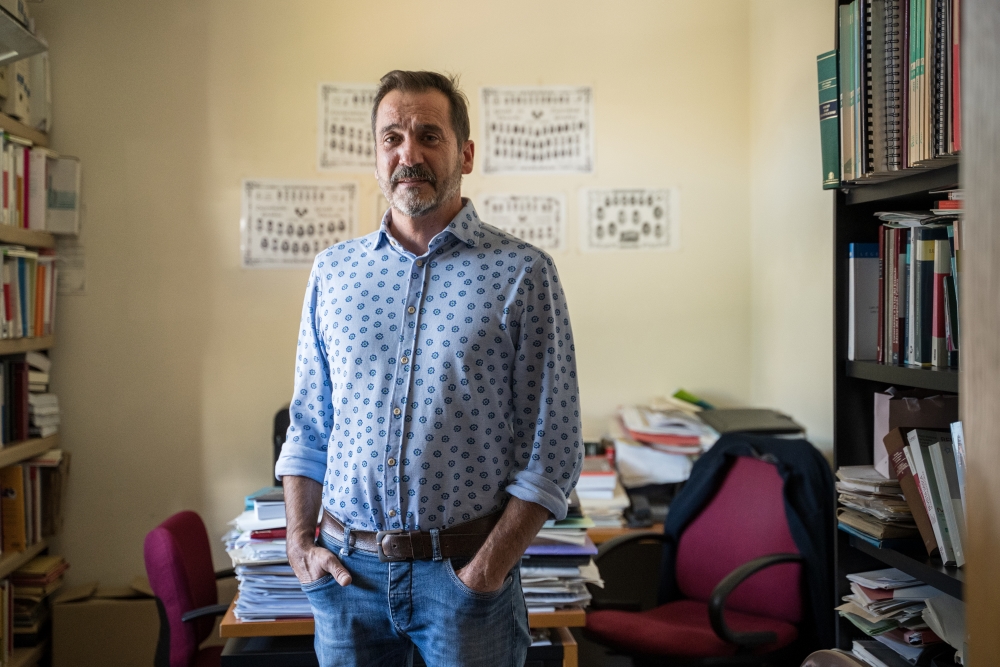Coronavirus and society
- The coronavirus pandemic has been a frontal attack on society, both in the medical and economic spheres.

As for the medical aspect, we do not know the origin, development, nature, immunity, vaccine and recyclability of the epidemic. In economics, following the media circus to which he is so keen to equate the situation with a war, it seems that a neutron bomb has erupted that destroys human life while respecting facilities and material goods.
As far as medicine is concerned, attempts have been made to minimize the Public Health System, in defense of a "sustainable capitalist system". The events that have taken place show that health must remain outside the market laws and the maintenance costs suffered by society. Today, to the shame of those who promoted and defended cuts in public health, it is not private companies that can save us, but the state, with its general health policies and its means.
Unfortunately, other countries have also made a commodity of the health system in the hands of private capital. It's a terrible example of what happened in the United States, where Trump destroyed the health system that Obama had left, and now you see the consequences.
Today, to the shame of those who promoted and defended cuts in public health, it is not private companies that can save us, but the state, with its general health policies and its means.
We have the opportunity to dismantle the neoliberal globalization of health gradually, without giving up its sustainability within a solidary thinking, recreating privatizations, making public the necessary services.
In economic terms, the most important thing is not to guide the measures to be taken to deal with the effects of the global economy arising from the economic forecasts and the coronavirus crisis. Chaos and terror have taken over the economy, and measures are tackled from very different perspectives and without coordination. This tumult comes from the fact that the pandemic was not intended to be a comprehensive attack on the Consumer Society, which since the twentieth century has become our human society and which can withstand the coronavirus crisis. The problem is not in the measures to be taken, but in accepting the nature of the problem.
Albert Einstein said: "It's crazy to do the same thing over and over again, in the hope of achieving different results," he added. The economic measures currently being taken are the reduction of interest rates, the increase in public spending, tax adjustments, the blocking of mortgages, the granting of subsidies to companies and tax rebates. These measures do not appear to differ substantially from those applied to keep the economy at risk since the financial crisis that began in 2008.
Interest rates are already at historical lows, taxes have been reduced in many countries in recent years, central banks have been operating with banknote machines for a decade, and yet the economy does not seem to come back to the surface again. The question, therefore, is: What is to be done?
Economic policies are already exhausted, fiscal policy is being called for. Tax measures, tax cuts or the exemption of unemployed workers are not the solution, but patches that cannot calm the storm. The pandemic has also affected the heart of the system, the stock market. The decline has been international.
An economic analysis indicates that we are facing a crisis of demand, a consequence of the reduction of demand, a consequence of the household confinement of consumers, but that, at the same time, it is a crisis of supply, due to its reduction, due to the closure of production facilities. For the first time there are two competing circumstances at the same time and we wonder what the future will be, taking into account new technologies, new materials, robotics, etc.
After the housing confinement of the population, we will see the depth of the economic crisis. In any case, the media conveys to us the constant fear of the population for lack of employment.

The current coronavirus pandemic is a unique opportunity to rethink our way of life, our way of production, our consumption and our relationship with nature. The time has come to question the "virtues" of the capitalist system: unlimited accumulation, competition, individualism, consumerism, waste, indifference to the misery of millions of people, state cuts and unlimited greed. That is the most important thing, and not that within the same chaotic system concrete forecasts and measures are taken.
If there are changes, it will take a long time to implement them and difficulties will arise, but remember that we are on the edge of the precipice and that we can fall to the precipice. Unfortunately, history shows us that social changes have never been made in a consensual way, but through the imposition of facts.
This pandemic cannot be tackled only with economic and health resources. It requires a change of relationship with nature and with the Earth. Let no one think it's the last pandemic, because if in the step we go, for climatic reasons, we get another one, we'll see where the "masks" that protect us come from. This crisis can be a joke in comparison to what can come to us by climate change.
Speculation is the engine of an individualistic system that survives through a constant attack on nature and the human being. The intensive exploitation of nature and its resources, until its depletion, has generated enormous pollution that has caused climate change to have had wild effects for the same nature and whose revenge rests on life on earth.
This system does not know the human being as part of nature, nature and humanity are like two different things, and not only that, but also the concept of humanity is not known, because the human being is conceived as a unit of its own that is not related to other human beings.
Speculation is the engine of an individualistic system that survives through a constant attack on nature and the human being. The intensive exploitation of nature and its resources, until their depletion, has generated enormous pollution that has had wild consequences on climate change.
Neoliberalism considers that the market is governed by the morality of human behavior, according to mercantilist considerations. This is detrimental to society and to the future of life.
Increasing production capacity and the globalisation of the economy require greater participation of the world’s population in consumption so that the capitalist system can survive. Social robotisation will eliminate jobs and new ones will be created. If employment is reduced as a result of automation, new unemployment support schemes will have to be put in place to continue consumption. Pollution and pollution will continue to be unstoppable.
Economic growth is linked, above all, to the need to conquer new markets, which attaches particular importance to advertising. It is a society that needs more consumers than workers.
From this commercial and depersonalized perspective, the subjects stop seeing themselves as individuals to move on to purely social functions, both in the use of these functions and at the statistical level, with a political, electoral or commercial purpose in favor of consumption.
The connection between prosperity and waste in rich societies is evident. All societies, in a way, spend, consume more than they need. In this way, the phantasmagoric definition of consumption is reached as productive waste, meaning any production and expenditure that goes beyond strict survival.
An innovative view of the purchases made in the Consumer Society is to see the time spent as a purchase. When we buy a good, we are buying the time it has taken to produce it. In a way, within the consumer society, time occupies a privileged place, it is the time consumed. How much time we spend on work to make enough money to buy the time that represents the useless things we buy.
The lack of time in humans causes an interior vacuum that affects health. It's isolated, empty, even though it's surrounded. Intelligence and the space conducive to advertising and propaganda is the complete alienation of aspects of great relevance in the Consumer Society.
Advertising is a mass media. Through this activity, messages reach the public to influence, teach and guide the purchase of goods and services, or the preference of any kind of thinking towards institutions or even people. It is one of the mechanisms that, through a set of actions, manages to transform ideas, impose trends, convince and influence the most insignificant decisions.
Thanks to advertising, consumption gives more importance to appearance, packaging, than to the product itself. The false idea of freedom and initiative is achieved through the forms that define the prototypes of conduct to imitate. The subjects seek to differentiate themselves from their peers, which is basically achieved through brands, brands that do not mark the product but the consumer.
Nowadays, in order to obtain a certain reputation in a particular brand or good commercial image, advertising, communication are usually used.
The main causes that led to the fall of fordism were the imitation of demand and the new trends, which suppose the substitution of functional value for an attractive value, fundamentally through the social phenomenon of “fashion”. People like to differentiate, and that was possible with the advent of new technologies.
Advertising and marketing techniques are responsible for manipulating the human mind so that it becomes a hijacking of consumer societies and unconsciously becomes the weapon of its own destruction.
The availability of subjects to consume standard products is decreasing, as mass consumption (consumerism) went from diversified consumption and the clients participated in the creation of the product (pro-submerism). This implies a plan for the obsolescence of consumption, in which products do not become obsolete because they lose their functional value, but because they are no longer "attractive".
Advertising expenditure is increasing in developed countries each year, both in companies and in public institutions and political parties. The ultimate objective of advertising is the implementation of certain conduct in the public, for which the target audience must be properly identified.
Advertising and marketing techniques are responsible for manipulating the human mind so that it becomes a hijacking of consumer societies and unconsciously becomes the weapon of its own destruction.
It's amazing the disgusting stench on the planet. Washington Post said in his editorial of March 25: "You cannot defend a planet that has 80% of the wealth concentrated in 1% of the population, able to shed innocent blood to sustain its status quo. They privatize water, sanitation, education, wind, sun. Universal Human Rights have become a commodity within the reach of a predatory and insatiable minority, while invisible majorities are seen in electoral processes disguised as democracy. Either Wild Capitalism dies, or human civilization will die."
Horren arabera, datorren astelehenetik aurrera, orain arte COVID-19ari aurre egiteko neurriak bertan behera geratuko dira Eusko Jaurlaritzaren eskumeneko alorretan. Labi bera ere desegin egingo dute.
That's the summer that we have, and with it the holidays that we usually link to this season, as if they were a reward to everything that has been given throughout the year. And again people want to go away. He wants to be on the famous coast, marvelous nature or the world's... [+]






















